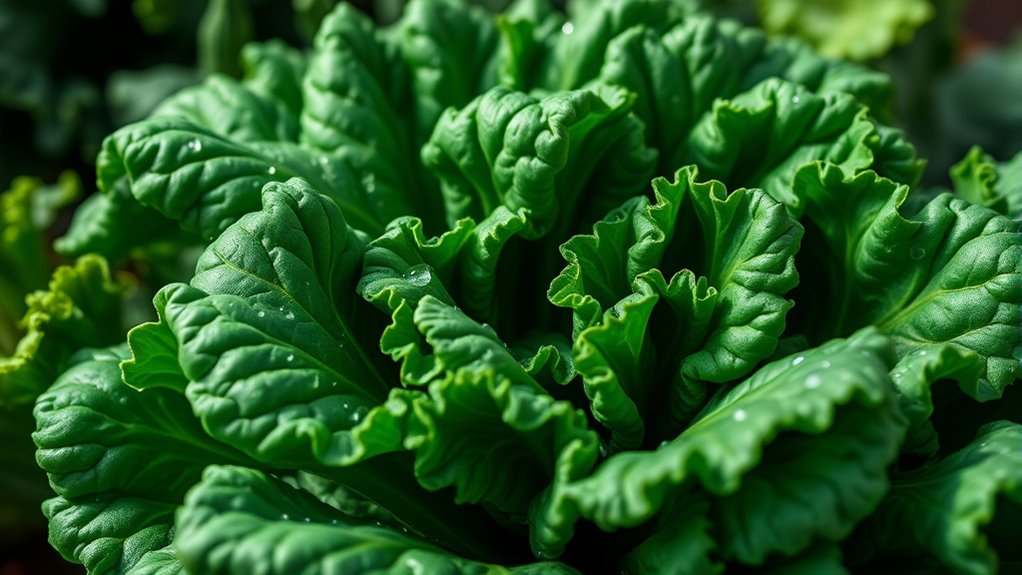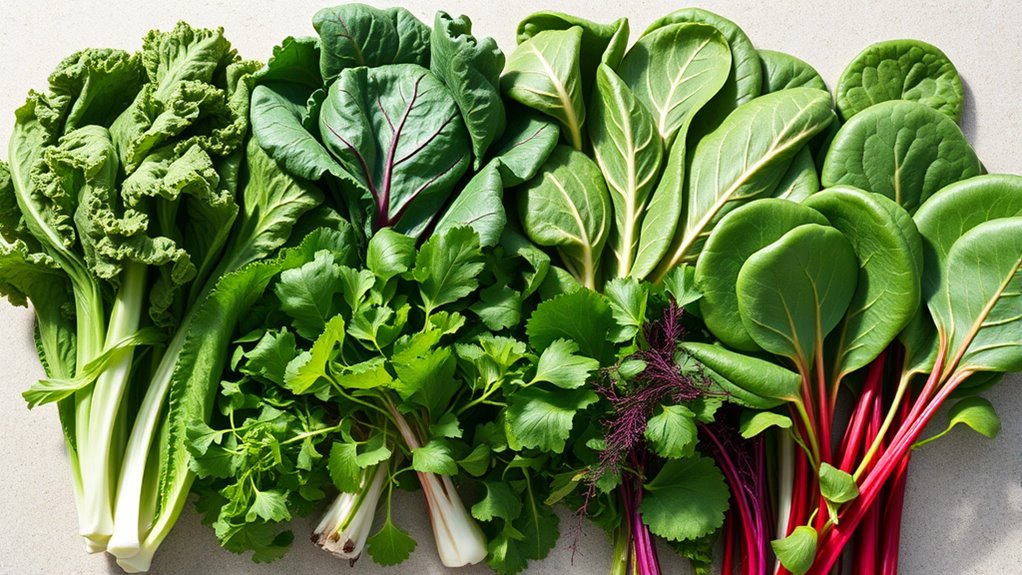If you’re seeking calcium sources that outperform milk without dairy, focus on greens like collard greens, kale, and bok choy. These leafy vegetables provide more bioavailable calcium, especially when low in oxalates that can block absorption. Nuts like almonds and seeds such as chia also contribute. Combining these with vitamin D-rich foods boosts calcium uptake. Keep exploring to find how these plant options can help you strengthen your bones naturally.
Key Takeaways
- Collard greens contain more calcium per serving than milk, making them a potent dairy-free calcium source.
- Kale and bok choy have low oxalate levels, enhancing calcium bioavailability compared to high-oxalate greens like spinach.
- Green vegetables with high calcium and low oxalates optimize calcium absorption without dairy.
- Combining calcium-rich greens with vitamin D sources improves mineral absorption efficiency.
- Fortified plant milks and seeds like chia offer comparable calcium levels to dairy products.

Many people avoid dairy due to allergies, lactose intolerance, or ethical reasons, but that doesn’t mean you have to miss out on essential calcium. You can find abundant plant-based sources that provide this vital mineral, guaranteeing your bones stay strong without relying on milk. The key is to select foods rich in calcium and understand how to maximize calcium absorption from these sources. While dairy is often regarded as the go-to for calcium, many greens and plant foods pack a powerful punch and can outperform milk when it comes to bioavailability.
Leafy greens like collard greens, kale, and bok choy are excellent plant-based sources of calcium. Not only do they contain high amounts of this mineral, but they also offer other nutrients beneficial for your health. For example, collard greens provide more calcium per serving than a glass of milk. However, it’s important to consider calcium absorption, as some plant foods contain compounds like oxalates, which can bind to calcium and inhibit its uptake. Kale and bok choy have lower oxalate levels, making their calcium more bioavailable compared to spinach, which is high in oxalates and therefore less efficient for calcium absorption.
Broccoli is another green that contributes to your calcium intake, along with Brussels sprouts and green beans. These vegetables are not only nutritious but also easier for your body to absorb calcium from, thanks to their lower oxalate content. Incorporating a variety of these greens into your meals can help guarantee you’re getting enough calcium while maximizing absorption. When combined with foods rich in vitamin D, which enhances calcium absorption, your body becomes even more efficient at utilizing plant-based sources.
Additionally, emerging technologies in agriculture are developing methods to increase the calcium content in certain greens, further supporting plant-based calcium intake. Nut and seed options, such as almonds and chia seeds, also provide calcium and can be easily added to your diet. Fortified plant milks and juices are additional options that offer calcium levels comparable to dairy, often with added vitamin D. Remember, pairing calcium-rich greens with healthy fats can further improve calcium absorption, as fat-soluble vitamins work synergistically with minerals.
Frequently Asked Questions
Can Non-Dairy Greens Provide Enough Calcium for Children?
You might wonder if non-dairy greens can supply enough calcium for children. Leafy greens like kale and bok choy are rich in calcium, but their calcium bioavailability varies. While they can contribute to daily intake, they may not provide as much absorbable calcium as dairy. To guarantee your child gets enough, combine leafy greens with other calcium sources or consider fortified foods or supplements, especially if dairy isn’t an option.
Do Green Vegetables Contain Other Essential Nutrients Besides Calcium?
Ever wondered if green vegetables offer more than just calcium? Leafy greens like kale, collard, and spinach provide essential nutrients beyond calcium, including vitamin K, magnesium, fiber, and antioxidants. These nutrients promote bone health, immune function, and overall wellness. Don’t overlook the nutrient diversity in greens—they’re a powerhouse that supports your health in many ways, making them a smart addition to any diet beyond just calcium content.
How Does Calcium Absorption From Greens Compare to Dairy?
You might wonder how calcium absorption from greens compares to dairy. Generally, plant-based calcium has lower bioavailability because compounds like oxalates and phytates can inhibit absorption. However, some greens like collard greens and bok choy offer better calcium bioavailability than others. While dairy provides readily absorbed calcium, incorporating high-calcium greens into your diet can still support your needs, especially when combined with vitamin D for improved absorption.
Are There Any Side Effects of Consuming High-Calcium Greens?
You might wonder if eating lots of leafy greens with high calcium affects you negatively. Generally, these greens are safe and rich in calcium bioavailability, meaning your body can absorb their calcium well. However, consuming excessive amounts could lead to kidney stones or interfere with mineral absorption. Moderation is key—balance your diet with a variety of foods to avoid potential side effects and guarantee ideal calcium intake.
Can Green Vegetables Help Prevent Osteoporosis Effectively?
Yes, leafy greens can help prevent osteoporosis effectively. They are rich in calcium and other nutrients essential for bone health. While some greens have lower calcium bioavailability, you can still benefit from their nutrients by eating a variety of leafy vegetables like kale, collard greens, and bok choy. Regularly including these greens in your diet supports strong bones, reducing osteoporosis risk over time.
Conclusion
You might have heard that dairy is the only way to get enough calcium, but that’s not true. These greens prove you can meet your daily needs without dairy, often outperforming milk in calcium content. By including a variety of these nutrient-rich vegetables in your diet, you can maintain healthy bones and overall wellness. So, don’t limit yourself—explore plant-based options and see how easily you can boost your calcium intake naturally.










